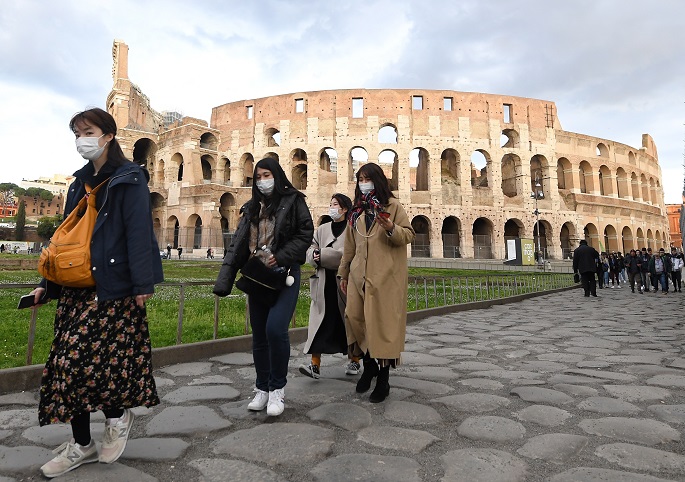Comprehensive measures adopted
Italy closes all schools, universities to contain COVID-19 spread
Published : 06 Mar 2020, 01:44
Italian authorities lately announced a series of measures to prevent the spreading of the COVID-19 on one side, and to support economic activities affected by this emergency on the other.
The latest package -- which included the closure of all schools, universities, and teaching courses across the country up to March 15 -- represented the most comprehensive and strict containment approach among those adopted outside Asia.
PREVENTIVE RULES
Prime Minister Giuseppe Conte announced the latest containment measures after a cabinet meeting late on Wednesday.
"The public health system risks to be overloaded, and we would face problems with intensive care and sub-intensive care units, in case an exponential crisis continues," the prime minister stressed in a televised press conference after the meeting.
The stop to all classes would involve over 8.6 million pupils in schools, and at least 1.7 million university students, according to statistics by the Education Ministry.
The government asked educational staff to continue provide students with remote teaching activities online as much as possible.
A temporary closure of schools and universities had already been ordered since late February in the regions with the highest number of coronavirus cases, such as Lombardy, Piedmont, parts of Liguria, Veneto, Friuli Venezia Giulia, Emilia Romagna and Marche.
The full closure, however, would impact harder on Italian families' daily life, and authorities sounded fully aware of that.
"It was not a simple decision to take... and we have waited to hear the opinion of the scientific-technical committee (counseling the government in the emergency) before taking it," Education Minister Lucia Azzolina told reporters.
Yet, experts agreed this was a relevant step in terms of prevention and protection.
"These measures were necessary, since we are the country outside Asia with the highest number of infection cases and of patients," said Gloria Taliani, professor of Infective Diseases with Sapienza University and director of the Clinic of Infectious and Tropical Diseases at Policlinico Umberto I in Rome.
"The closure of schools is very helpful, and hopefully effective, because promiscuity between classmates is supposed to be very high in Italian schools," she told Xinhua.
Another containment measure in the latest decree concerned all sporting events, including many matches of the Serie A football League, which will be held behind closed doors until April 3.
A stricter rule would apply to the "red zones" -- ten towns under quarantine in Lombardy, and one town in Veneto -- where all sport events were suspended until the end of the emergency.
The decree also ordered to suspend any meeting, congress, or social event "involving medical staff or personnel in charge of primary public services."
All cultural events were stopped, including those in cinema and theaters, unless they could guarantee "the compliance with the interpersonal safety distance of at least one meter."
Finally, the government recommended people over 65 and those with chronic diseases to stay at home as much as possible, and, in any case, to avoid crowded places.
In the same way, it strongly suggested (but not ordered) companies to implement "smart-working" practices in remote among their employees.
As for the school closure, the virologist confirmed the helpfulness of all the other key measures. She explained that suspending all events (cultural, sports, theater and cinema shows) was "one of the utmost important containment steps in pre-pandemic conditions."
Taliani also warned the recommendation concerning companies should also be fully applied.
"The gov't has strongly suggested companies to implement remotely working mechanisms, but did not force anyone, and, for what I know, some firms are still holding personnel meetings... which sounds risky and strange to me," the scholar stressed.
"This is also an extremely useful preventive measure, and the gov't should put its efforts in having them truly implemented."
FINANCIAL STEPS
Meanwhile, the government passed a first emergency package worth some 900 million euros (1 billion U.S. dollars) to support companies and households in the 11 towns put under quarantine in Lombardy and Veneto. The measures included the suspension of some payments and delays in taxes and house mortgages.
On Thursday, the cabinet announced a second and broader package of financial stimulus.
"Specifically, we have allocated a total of 7.5 billion euros to support households and companies facing what is not only a health emergency, but an economic emergency," Prime Minister Conte said after the cabinet meeting.
Within the latest financial provisions, some 100 million euros were allocated to the Civil Protection Department coordinating the coronavirus task force, in addition to 5 million euros already allocated on Jan. 31, when the national emergency was declared, according to a cabinet statement.
With the closure of schools and elders advised to stay at home as much as possible, the government was now discussing further measures to help families facing the extra costs for babysitting and elder care.
"We are thinking of a possible financial support to cover the costs of babysitting through vouchers... and also of extraordinary leave permissions to workers who have children and grandparents," Elena Bonetti, Minister of Equal Opportunities and Family told local media.
A priority concern for the cabinet -- Economy and Finances Minister Roberto Gualtieri specified in a separate press conference during the day -- was to make sure that "no Italian loses his or her job because of the coronavirus."


